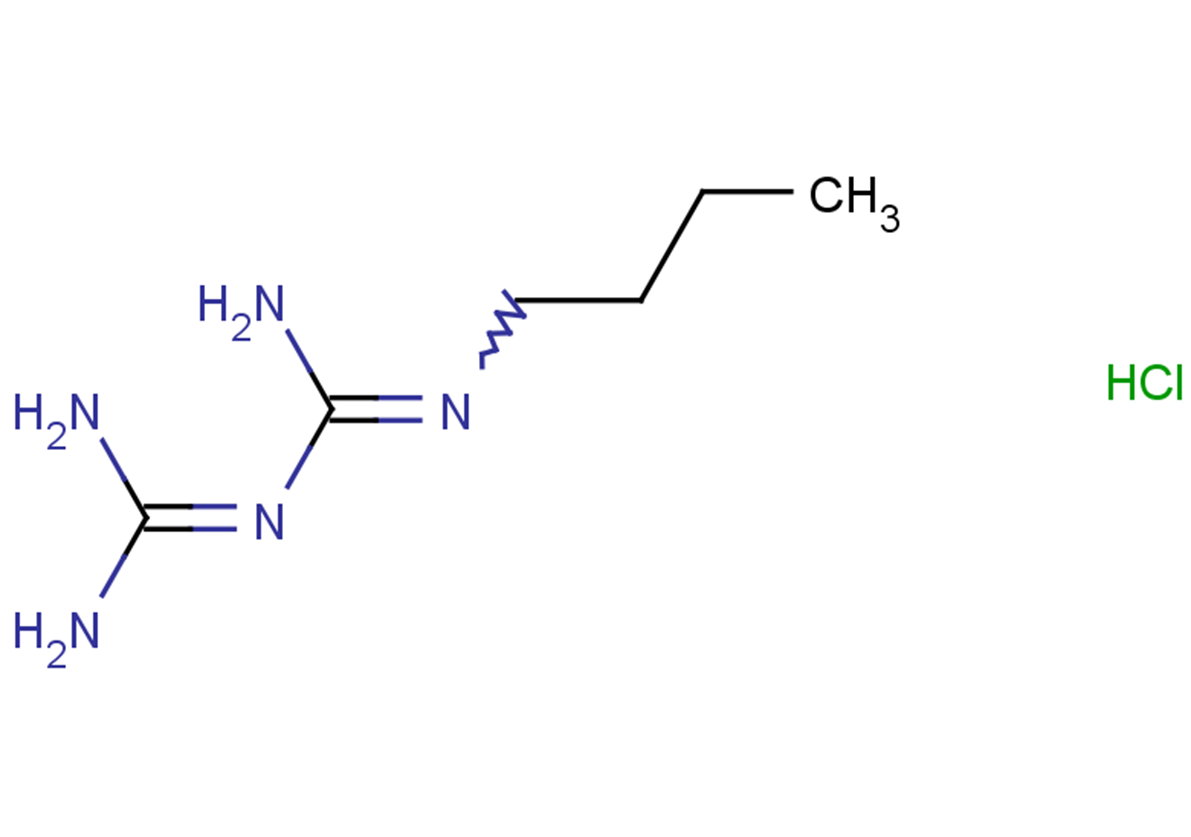
Buformin hydrochloride
CAS No. 1190-53-0
Buformin hydrochloride( NSC 528218 | NSC-528218 | NSC528218 )
Catalog No. M23359 CAS No. 1190-53-0
Buformin hydrochloride is a potent AMPK activator,an oral antidiabetic drug of the biguanide class.
Purity : >98% (HPLC)
 COA
COA
 Datasheet
Datasheet
 HNMR
HNMR
 HPLC
HPLC
 MSDS
MSDS
 Handing Instructions
Handing Instructions
| Size | Price / USD | Stock | Quantity |
| 50MG | 58 | In Stock |


|
| 100MG | 87 | In Stock |


|
| 200MG | 142 | In Stock |


|
| 500MG | 267 | In Stock |


|
| 1G | Get Quote | In Stock |


|
Biological Information
-
Product NameBuformin hydrochloride
-
NoteResearch use only, not for human use.
-
Brief DescriptionBuformin hydrochloride is a potent AMPK activator,an oral antidiabetic drug of the biguanide class.
-
DescriptionBuformin hydrochloride is a potent AMPK activator,an oral antidiabetic drug of the biguanide class. Buformin delays the absorption of glucose from the gastrointestinal tract increases insulin sensitivity and glucose uptake into cells and inhibits synthesis of glucose by the liver. Biguanides may antagonize the action of glucagon, thus reducing fasting glucose levels.
-
In VitroCell Viability Assay Cell Line:ErbB-2-overexpressing SKBR3 and BT474 cells Concentration:0 μM, 1 μM, 3 μM, 10 μM, 30 μM, 100 μM, 300 μM, 1, 3, or 10 mM Incubation Time:5 days Result:Reduced cell viability in erbB-2-overexpressing breast cells.Cell Cycle Analysis Cell Line:ErbB-2-overexpressing SKBR3 and BT474 cells Concentration:0.5 mM; 1 mM; 3 mM Incubation Time:48 hours Result:Increased cells arresting in G0/G1 phase.Western Blot Analysis Cell Line:ErbB-2-overexpressing SKBR3 and BT474 cells Concentration:0 mM, 0.1 mM, 0.3 mM, 1 mM, or 3 mM Incubation Time:24 hours Result:Decreased p-AMPK, p-p706S, p-ERK1/2 expression in a concentration-dependent manner.
-
In VivoAnimal Model:Female MMTV-erbB-2 transgenic mice Dosage:7.6 mmol/kg Administration:Oral administation; 7 days Result:Inhibited mammary syngeneic tumor growth in MMTV-erbB-2 transgenic mice.
-
SynonymsNSC 528218 | NSC-528218 | NSC528218
-
PathwayMembrane Transporter/Ion Channel
-
TargetAMPK
-
RecptorAMPK
-
Research Area——
-
Indication——
Chemical Information
-
CAS Number1190-53-0
-
Formula Weight193.68
-
Molecular FormulaC6H16ClN5
-
Purity>98% (HPLC)
-
SolubilityDMSO:Soluble
-
SMILESCCCCN=C(N)N=C(N)N.Cl
-
Chemical Name——
Shipping & Storage Information
-
Storage(-20℃)
-
ShippingWith Ice Pack
-
Stability≥ 2 years
Reference
1.Amanda B Parris, et al. Buformin hydrochloride Inhibits the Stemness of erbB-2-overexpressing Breast Cancer Cells and Premalignant Mammary Tissues of MMTV-erbB-2 Transgenic Mice. J Exp Clin Cancer Res
molnova catalog



related products
-
A-769662
A small molecule AMPK activator that directly stimulates partially purified rat liver AMPK (EC50=0.8 uM) and inhibits fatty acid synthesis in primary rat hepatocytes (IC50=3.2 uM).
-
Metformin hydrochlor...
Metformin Hcl, a widely used anti-diabetic drug has potential efficacy as an anti-Y drug.
-
Onjisaponin B
Onjisaponin B induces autophagy via the AMPK-mTOR signaling pathway, increases the NGF level and accelerates both the removal of mutant huntingtin and A53T α±-synuclein, it may have potential therapeutic effects on Parkinson disease, Alzheimer disease and Huntington disease.



 Cart
Cart
 sales@molnova.com
sales@molnova.com


